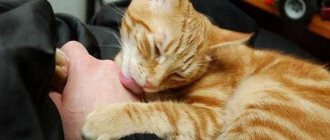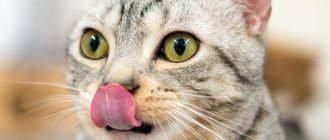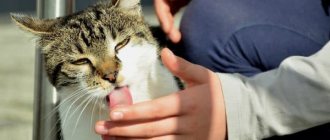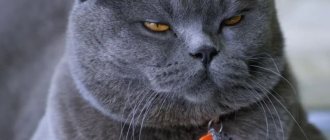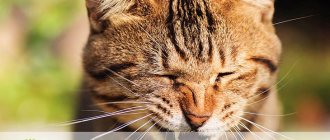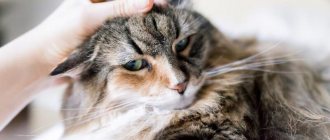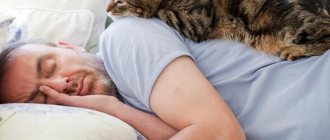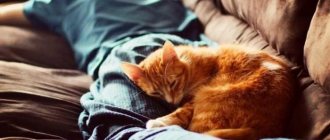13467Administration
1
On veterinary forums, cat owners are interested in questions: “Why did the cat start licking the walls and floor?”, “What to do if the kitten licks surfaces and eats inedible objects?” Indeed, it is almost impossible not to notice that a cat is licking the floor, concrete walls, wallpaper, sofa or gnawing on stones. Incorrect behavior of a pet is accompanied by anxiety, nervousness, or vice versa, the cat becomes very affectionate. Let's try to figure out what causes this condition of the furry pet.
Why does a cat lick the floor and walls?
If a cat licks walls, concrete surfaces, wallpaper, or eats chalk with pleasure, the reason should be sought in functional system failures in the body, which are provoked by the deterioration of the furry pet’s health. As a rule, this behavior of cats is provoked by a deficiency of macro-microelements in the animal’s body. If a cat begins to lick the floor, the wall is littered with marks from the cat’s teeth; one of the possible reasons is hypocalcemia. Characterized by a violation of phosphorus-calcium metabolism. The disease develops due to a deficiency of calcium and vitamin D3.
Scary: dehydration
If your cat is licking a floor with a smooth, cool surface, it may be a sign that she is not getting enough water.
Under the right conditions, small amounts of water can form on the surface of tile and concrete floors due to condensation.
Even if you give your cat bowls of water, they will find this source of liquid preferable.
Cats don't just avoid their water bowls because of condensation. Some cats prefer to drink from taps and other moving water sources.
Treatment components
Treatment is prescribed by a veterinarian after examining the pet. Show the doctor the drug you treated him with. You also need to tell about your animal’s concomitant diseases, whether he is allergic to medications or food components.
After examining the pet, the doctor will begin providing first aid. It may consist of:
- intravenous or intramuscular administration of steroids. The most commonly used drug is dexamethasone . This drug quickly eliminates allergic manifestations and improves the pet’s condition;
- droppers with solutions to reduce intoxication and accelerate the removal of toxins from the body through the kidneys;
- administration of antihistamines (antiallergic) drugs, this can be diphenhydramine, suprastin, loratadine.
After providing first aid, the doctor will prescribe a course of treatment. You can give some medications to your animal yourself. For injections and IVs, you will need to bring your animal to the veterinary clinic.
Other reasons
If a cat begins to lick the floor, peels off wallpaper, but the pet is active and feels normal, perhaps the animal is doing this out of boredom, attracting the owner’s attention. In some cases, an affectionate cat becomes aggressive towards members of its family or, on the contrary, caresses, constantly licks the hands and face of the owner.
If the cat eats inedible objects, behaves inappropriately, attacks of aggression are replaced by a depressed state, we recommend checking the cat for rabies. This behavior is observed in pseudorabies (Aujeszky's disease), a nervous form of plague.
The risk of contracting dangerous infections increases in unvaccinated cats that walk outside and may come into contact with stray animals.
Stress, nervous shock, anxiety are common causes of compulsive-obsessive behavior in animals..
Why does a cat lick obsessively?
Cats who obsessively lick may be suffering from either boredom or a compulsive disorder. Often, compulsive licking of cats is a sign of persistent mental imbalance. Cats may also suffer from anxiety or other mental health problems.
If your cat seems to be a compulsive licker, spend time trying to redirect her attention away from licking herself and toward other playful activities.
Compulsive licking is more common in cats that live primarily indoors, as their surroundings are often less stimulating than cats that have free rein to explore their environment.
Another incident that can cause your cat to start licking is a big change in your home environment. If you recently brought home a new baby or a new pet, this may cause your cat to have a compulsive fit.
Scary: cleaning products
Continuing with the theme of taste and smell, your cat may enjoy the smell of certain household cleaning products.
For example, some cats love bleach. The chlorine in bleach can smell like cat urine pheromones. The ammonia in other cleaning products also smells very similar to your cat.
Some cats go crazy over the smell and some ignore it. Others may think that another cat has marked their territory, which may result in those cats being sprayed.
Simple: Taste
I hope you agree with me when I say that the idea of licking the floor doesn't make me tingle.
However, your cat's tastes are very different from your own. And their finely tuned noses also allow them to pick up things you don't even notice.
Many of our floors are made from composite materials. Just like plastic bags, they may contain compounds that your cat simply cannot resist.
Likewise, concrete floors may taste like minerals, salts, and moss, which your cat may find interesting.
Simple: something tasty on the floor
Let's deal with the most obvious reason first. If you drop food on the floor, your cat will be all over it.
Even after the food has disappeared, the smell and taste may remain. Your cat's extraordinary sense of smell means that she will notice even the most subtle odors.
My cats sometimes get raw chicken scraps as a treat. They often end up dragging chicken pieces out of their bowls onto the tile floor.
Not surprisingly, as soon as the chicken leaves, they start licking the tiles, which apparently still taste like chicken.
© shutterstock
The cat eats sand
Silica gel litter for toilet
Silica gel litter for cats can also be called gel. Despite the fact that the ability to absorb moisture of silica gel litter for cats is at the highest level, not all cats like this litter. Some pets make it clear that they will not go there by demonstratively doing “things” on the floor next to the tray. Silica gel is not harmful to cats. Silica gel cat litter is made from synthetic transparent crystals. They have sharp edges and rustle loudly. Maybe that's why some cats don't like him.
Silica gel litter is absolutely not suitable for kittens, because they will taste it “to the teeth”, and this can be very dangerous.
As for the owners, silica gel cat litter is perhaps the most economical of the entire range of types. Although the cost of a package of such filler is high, there is one caveat: the thicker the layer, the less often you have to change the filler. You can try, for example, “Fresh Step” silica gel litter for cats. Fresh Step cat litter is called so because, thanks to its patented highly absorbent formula, it does not allow odor to spread. Every time the pet goes to a “fresh” toilet.
Japanese fillers
The Japanese produce good fillers for good money. Thanks to their developments and the use of environmentally friendly raw materials, the Japanese are finding their niche in the toilet fillers market.
The product line includes the following types of toilets:
- clumping litter made from crushed cypress wood and corn starch;
- clumping carbon filler made from Japanese cellulose with the addition of charcoal;
- clumping filler made of paper and starch with a color indicator;
- filling made from compressed soy fibers, the so-called “tofu”.
Why does a cat lick concrete?
At first it looks funny. Fluffy carefully, enthusiastically runs his tongue along the seams between the tiles, along the wall, cement or stones on the street. The owners laugh at themselves and don’t even think about grief. They would have changed their mood if they had learned in time that in about 60% of cases the cat licks the walls due to health problems! There are a lot of assumptions about this:
- The Internet likes to promote a common misconception about calcium deficiency. They say the cat is restoring its mineral balance, and that’s all. But it was not there.
There is also a completely objective reason - the cat has a foreign body in its stomach. Don’t be alarmed, your tailed one was not visited by a UFO. Perhaps he himself inserted a foreign object inside. For example, this is wool, or wrapping from sausage, meat, etc.- The most unpleasant, and, unfortunately, common reason why a cat licks plaster, concrete, walls, asphalt or stones is a disease of the internal organs.
Others believe it is due to an unpleasant taste/smell in the mouth. The cat eats up these troubles, distracting its receptors at least while licking the cement.
Mental disorder
In human psychiatry there is such a thing as pica - the desire to eat inedible things. The pathology is referred to as an eating disorder due to a psychological state. The condition is considered serious, similar in severity to anorexia nervosa, bulimia and other eating disorders, which can lead to death.
Unfortunately, very little research on psychiatry is conducted in the veterinary field. Animals cannot speak and this is the main difficulty. However, even primitive observations helped establish that pets are prone to depression, phobias and other somatic disorders. Globally, pica is divided into general disorder and coprophagia. In the first case, the animal eats stones, earth, paper, any waste and inedible materials, in the second - feces. Cats are prone to both forms of pica.
Even the most experienced veterinarian is unlikely to be able to name the exact causes of a mental disorder. Most often, the cause is formed against the background of several factors that took place in the life of the animal. The owner may not have any idea about the experiences of the ward, which greatly complicates the diagnosis. Based on experience, doctors can only speculate about the reasons.
Hunger - when a domestic cat finds itself outside, it hides and the only thing that can drive it out of its hiding place is the desire to eat. Unfortunately, the psyche of many animals cannot tolerate such severe stress and the animal is literally exhausted from hunger, but does not come out of its shelter. If the owners discover their loss and manage to save it, the consequences are unpredictable.
Reasons – physiological, psychological and behavioral
Correct behavior and etiquette are instilled in the kitten at a very early age, up to 3 months. Usually, the breeder or the cat mother directly raises the baby. If you decide to rescue a kitten from a shelter or from the street, the manners of your newly adopted ward may not please you. The positive thing is that you can stop a cat from scratching furniture, wallpaper or damaging other things at any age. Naturally, the older the cat, the stronger its habits and the more time it will take.
Many inexperienced owners prefer to punish their pet or even beat it, hoping to develop a conditioned reflex: if you touch the curtains, it will hurt. By acting in this way, the owner does not take into account at least two important factors:
The cat needs to sharpen its claws, and by digging into the sofa, it literally cleans off the dead layer of the nail plate.
All cats are territorial and mark their territory with scent. Between the fingers of the ward there are glands that secrete an odorous secretion. This is where every corner, curtains and door frames come under attack, since they are located along the perimeter of the home or room.
The second most popular reason is stress. If we summarize all the popular factors, we get the following conclusion:
Jealousy - towards other animals, a new tenant or a child. In this case, the cat will scratch the furniture with the smell of a stranger and the walls of “his territory.”
Territoriality – tattered curtains, wallpaper near the front door and windows, indicating the pet’s anxiety. Perhaps your purr sees other people's cats from the window or smells them near the door. Scratching surfaces, the pet leaves marks: “I live here, the territory is occupied!”
Conflict with other pets in the house – This will affect feeding areas, sofas and other shared areas where your pets (usually) have conflict.
Other stresses are a change of owner, moving, death or illness of a family member, long absence of the owner, lack of attention and/or care from the owner, etc.
The third reason, which is entirely dependent on the owner, is poor or untimely upbringing. Let us highlight several sub-points that will significantly affect the education process:
Age of the pet - young cats and kittens may simply not know that furniture and wallpaper should not be damaged.
Age of habit - if the pet has already tasted the delight of peeling off soft, textured, so alluring wallpaper and has done this several times, re-education will take longer.
Boredom is the lack of toys and, as mentioned above, attention from the owner.
By observing your pet, you can easily determine the reasons for incorrect behavior. If the pranks are associated with a lack of upbringing or the pet’s lack of self-confidence, it is necessary to immediately take up re-education. It’s worth starting with providing comfort and conditions for claw care.
What to do if your cat is poisoned by bleach
A pet who has ingested bleach should be given as much fluid as possible (in addition to water, milk can be given). This way you can quickly remove toxins from the body. But you cannot induce vomiting in an animal without the consent of a veterinarian.
You need to open the windows to let fresh air into the room. If your pet's eyes get in contact with chlorine, they should be rinsed with plenty of running water. In addition, it is necessary to wash off the product from the animal’s skin with water, and also rinse the mouth with water. And then it is urgently required to deliver the injured poor fellow to the veterinary clinic. Without timely veterinary care, death cannot be ruled out.
The cat licks everything. This is problem?
It's nice to look at a cat that washes itself and puts itself in order. It’s touching when a furry pet licks its owner a couple of times - apparently as a sign of special affection. But it also happens that a cat licks and licks everything, completely random things and objects. What does this mean, should owners be wary? Details are in the article.
Passion for licking yourself
This is not your pet's love for cleanliness and order! You should sound the alarm, because you are dealing with a form of mental disorder in an animal. In science it is called “psychogenic alopecia.” Cats are more susceptible to this disorder, most often purebred cats, representatives of the so-called “eastern breeds”. They are much more excitable and have a delicate and sensitive nervous system. Through obsessive constant self-care, animals try to cope with internal experiences, stress, and try to put their thoughts and feelings in order. The reasons can be very different - moving to a new apartment, late guests, new family members or pets, even a change in the location of the tray. Try to find out what exactly makes your cat unbalanced, try to help her.
How to break your pet's habit
When an owner is annoyed by such excessive attention from his cat, there are several ways to try to get rid of this habit:
A game
By switching attention to entertainment and giving your pet an outlet for energy, you can relieve her for a while from the desire to lick something or someone. Weasel. If the problem is stress or lack of attention, you need to pet and hug the animal more often, and the problem will disappear soon. Change of interests
Apply a special solution – catnip – to your pet’s toys. It is sold in pet stores. Its scent will attract the cat's attention. Refusal. If your pet's behavior becomes overly intrusive, every time he tries to lick him, you need to gently but decisively push him away and make it clear that this is not worth doing. After some time, the method will work and the cat will stop trying. Substitution for another item. Buy a fur mitten and put it on your hand every time you try to lick your fingers. After time, attention will switch to the object, and the owner will no longer be needed.
It is worth remembering that such behavior of a pet can be due to a whole range of different reasons and there is no need to be angry with him or scold him for it.
After all, with such behavior the cat does not want to cause harm, but is simply trying to attract the owner’s attention to his person or show love
Some owners adore their cat, show constant care, and in return receive scratches and an angry twitch of the tail, others pay almost no attention to the pet, but it constantly licks the owner’s face and hands.
But everything is not so simple; the reasons why a cat licks hands are often far from immeasurable love.
How to wean it off?
In order for a cat to stop sucking a blanket, the very first thing you need to do is eliminate or reduce the number of objects around that can be used for sucking. No source, no problem. You can repel with a spray bottle of water or aromatic oils with citrus scents. Veterinarians also insist on conducting a full examination and identifying possible causative diseases or complications. If a deficiency of nutrients and vitamins is detected, the cat is prescribed a special diet.
It is important to distract the student from unwanted games. Especially important are those that will develop trust between the purr and the owner.
When you see your pet doing an obscene activity, you need to distract him for at least 10-20 minutes so that the cat’s brain has time to switch. At the end of the game, you can pet the animal or offer it a treat. Then he will enjoy the entertainment, and not from sucking on the blanket. It is important to provide the child with toys that will not let him get bored during the day when the owners are at work.
Taking care of hygiene
Well, of course, when licking a person, a cat tries to clean his “skin”, just as she is used to caring for her kittens. In the wild, a strong smell can give away an animal and attract an enemy. To destroy it, the cat will carefully lick hands washed with scented soap or neck or hair scented with shampoo.
You should not show your cat dissatisfaction with such a toilet. If you often drive a cat away, avoiding its rough tongue, the emotional connection and trust in the person may be disrupted. Saving him from danger, endowing him with the aromas of his “group”, the cat expects recognition and affection in return.
To maintain cleanliness
Self-licking is a natural and very common mechanism for caring for one's own body in the animal kingdom.
Cat licking rituals like these are a demonstration of love for cleanliness:
- The cleanest. Sometimes it seems that keeping oneself clean is the main task of a feline brother. Taking the most graceful poses, Murka licks herself for hours, touchingly washes her face with her paws and rubs her ears. She does this many times a day: after sleeping, feeding, taking care of her natural needs, and even stroking her. A cat's tongue, covered with miniature hooks and therefore rough to the touch, combs and arranges hairs like a brush, removing dirt and foreign odors. During this massage, blood flow is stimulated and the skin glands intensify the production of an oily secretion, which lubricates the hair and protects it from moisture.
- “No” to foreign odors. The desire to lick a person may be motivated by the desire to destroy unusual scent marks. According to the cat's understanding, all perfumes, including perfumes, soaps, shampoos and creams, have unnatural and even unpleasant odors, which must be urgently gotten rid of. This is why the cat spends so much time and carefully licking its own area of the body with medicinal ointment applied to it.
- Tempting aromas. Some cosmetics, on the contrary, can be very attractive to mustachios. Such, for example, is a hand and nail cream with an extract of medicinal valerian, which has a magical effect on cats and activates the owner’s obsessive licking. Some cats love the smell of peony tincture and therefore tend to lick the hands or lips of a person who has taken this sedative. Cats are also attracted to human sweat, which contains odorous substances similar to animal pheromones. So the owner, returning from a morning jog or after a hard work shift, smells very attractive to the murka.
World of cat scents
By the way, cats also have unloved odors:
- Cats are not fond of citrus scents. If you put the skins of oranges or lemons in the pot of a flower that your pussy is nibbling on, it will ignore that place.
- You can spray the area where you don't want a cat's presence with acetic acid. Cats cannot stand this smell. It will seem to a person that it has disappeared within just a few minutes, but your mustachioed friend will feel it for a very long time.
- Lavender, mint, and rue are suitable as natural “horror stories.” They can be placed in a garden area where there is no place for cats.
- You can buy cat repellent spray in specialized stores. The method of application is simple: where the cat has adapted to walk “big”, you need to spray the spray. Animals avoid such places; they don’t like them.
A person in modern society is simply obliged to observe the rules of personal hygiene, smell nice and look neat.
But what to do if all the rules are followed, but an unpleasant odor still emanates from the body? Every person, under certain conditions, tends to sweat. The smell of sweat is different for everyone, but it happens that the sweat takes on a sour smell, the smell of ammonia, vinegar, or even worse - the sweat smells like cat urine. Human sweat consists of 99% water, and 1% urea, salts, acids and other chemical compounds. If he starts to smell like cat urine, this indicates an increased secretion of urea and uric acid. These substances settle on the hairs in the form of crystals and cause unpleasant odors. Moreover, a similar phenomenon is observed in both women and men. People’s first reaction: what will others think of me, will they judge me, criticize me. But in this situation, you need to think not about the gossip around you, but about your own health, since any unpleasant body odor can be a symptom of very serious diseases of vital organs. In this case, get tested as soon as possible.
How to wean it off?
In order for a cat to stop sucking a blanket, the very first thing you need to do is eliminate or reduce the number of objects around that can be used for sucking. No source, no problem. You can repel with a spray bottle of water or aromatic oils with citrus scents. Veterinarians also insist on conducting a full examination and identifying possible causative diseases or complications. If a deficiency of nutrients and vitamins is detected, the cat is prescribed a special diet.
It is important to distract the student from unwanted games. Especially important are those that will develop trust between the purr and the owner.
When you see your pet doing an obscene activity, you need to distract him for at least 10-20 minutes so that the cat’s brain has time to switch. At the end of the game, you can pet the animal or offer it a treat. Then he will enjoy the entertainment, and not from sucking on the blanket. It is important to provide the child with toys that will not let him get bored during the day when the owners are at work.
Breeders remind you that care should be taken to have several scratching posts, high shelves or a whole complex. The tray and feeding area should be kept clean. Then the animal will feel comfortable and safe. You should never punish or beat for bad behavior or strange addictions.
On the contrary, you need to surround your pet with care, affection and attention, then he will not have the desire to attract attention to himself by sucking on a blanket
It is important to learn to understand your pets, how they think and why they do things. Many breeders are interested in why a cat sucks a blanket.
This is one of the strange and bad habits that requires special attention from the owners. If you do not resolve the issue, you will not be able to avoid negative consequences.
In order for a cat to stop sucking a blanket, the very first thing you need to do is eliminate or reduce the number of objects around that can be used for sucking. No source, no problem. You can repel with a spray bottle of water or aromatic oils with citrus scents. Veterinarians also insist on conducting a full examination and identifying possible causative diseases or complications. If a deficiency of nutrients and vitamins is detected, the cat is prescribed a special diet.
It is important to distract the student from unwanted games. Especially important are those that will develop trust between the purr and the owner.
When you see your pet doing an obscene activity, you need to distract him for at least 10-20 minutes so that the cat’s brain has time to switch. At the end of the game, you can pet the animal or offer it a treat. Then he will enjoy the entertainment, and not from sucking on the blanket. It is important to provide the child with toys that will not let him get bored during the day when the owners are at work.
Breeders remind you that care should be taken to have several scratching posts, high shelves or a whole complex. The tray and feeding area should be kept clean. Then the animal will feel comfortable and safe. You should never punish or beat for bad behavior or strange addictions.
On the contrary, you need to surround your pet with care, affection and attention, then he will not have the desire to attract attention to himself by sucking on a blanket
Some cats suck a blanket, for some reason periodically chew their owner's sweater, and are not averse to tearing into pieces and eating a woolen blanket. Geophagy (eating inedible things) begins with sucking.
The owner explains this behavior by immaturity: sucking the tail, fur or paw - he misses his mother. This is mistake. Let's look at how to wean a kitten from the sucking reflex before the hobby develops into uncontrollable eating or slobbering on interior items.
Inflammation of the anal glands and postoperative sutures
On the sides of the anus there are paired formations - paraanal glands, which are necessary for marking territory, attracting partners for mating, and scaring away large predators. In case of digestive disorders, injuries, pregnancy, the excretory ducts become clogged, the secretion remains inside, and paraproctitis develops. The pet smells bad, he licks the sore spot and rubs it on the floor.
Elderly pets living in high-rise apartments, castrati and obese cats are predisposed. The solution to the problem is cleaning the anal glands, rinsing them or removing them. Prevention consists of feeding with professional nutrition of at least premium class.
If the course of wound healing is unfavorable after castration, suppuration develops or copious exudate is released. The cat begins to lick the seams, which can provoke an inflammatory process. The optimal solution is to treat the defect with an aerosol antiseptic wound healing agent to create a gauze-free dressing. In some cases, a cervical collar is put on the cat.
Simple: texture
No floor is perfectly smooth, and over time these surfaces can become even more textured due to wear and tear.
Wood and cement floors can be particularly rough in places, and your cat will enjoy licking them.
Cats can suffer from obsessive-compulsive disorder, which manifests itself in a variety of ways, including repeated licking.
Indeed, cat owners report that their cats chew firewood, a problem with similar origins.
Symptoms of poisoning in cats
If a person himself can, in most cases, determine his poisoning by two or three symptoms, then as for a cat, not everything is so simple. Much depends on what poisoned the animal. If these are spoiled products, the symptoms will be the same, but if they are rat poison or household chemicals, then there is a completely different clinical picture.
Symptoms of poisoning in cats and cats are:
- diarrhea and vomiting, often with mucus and blood
- state of apathy or tremor, trembling
- increased breathing, convulsions
- increased excitability and inappropriate behavior of the animal
Each of these signs can become a symptom of poisoning
Of these symptoms, the safest for a cat are one-time vomiting and intestinal upset, with a stable condition and the absence of other signs.
In all other cases - repeated vomiting and other symptoms - contact the clinic immediately!
Why does the puppy eat dirt and stones?
Any dog owner will be horrified when he notices his puppy eating dirt. Stones that a dog swallows along with soil are not digested. Once in the gastrointestinal tract, they injure the soft tissues of the intestines and stomach. In addition, the animal can damage its teeth, choke and suffocate. To wean a puppy from a bad habit, you need to understand the motives of his behavior.
Causes
In veterinary practice, the need for non-food products is called perverted appetite. There may be several reasons why a puppy eats dirt. These include:
- Curiosity. Puppies are active and inquisitive. Like small children, they explore the world around them and taste everything. The discomfort caused by cutting teeth “adds fuel to the fire.”
- Boredom. Often, eating stones is an attempt to attract the owner’s attention to oneself. Don't get a dog if you don't have time to spend on it.
- Nutrient deficiency. A lack of vitamins and minerals, such as iron, can encourage your pet to eat soil.
- Helminthiasis. Deworming tablets should be given to all pets living in the house at the same time. Don’t forget about your own health: not only animals, but also people should be treated for helminths.
- Other diseases: diabetes, gastrointestinal disorders, heartburn, etc.
Are you wondering why your puppy eats dirt? Start by going to the vet. These examinations will show whether stone eating is caused by illness or behavioral problems.
Why are stones dangerous?
Have you noticed that your puppy is eating rocks and dirt? Don't let things take their course, don't let the habit take root in your pet's mind. A perverted appetite can be fraught with the following problems:
- Intestinal obstruction. A swallowed stone can block the intestines and cause obstruction. Lack of surgical intervention is fraught with death.
- Damage to teeth, soft tissues of the pharynx. Do not confuse a puppy with pet rodents, whose teeth grow throughout their lives and need to be ground down. If a dog's teeth become damaged, it will not be able to chew food.
- Injuries to the esophagus and other organs. Sharp stones can cause internal bleeding, which will be very difficult to detect.
- Vomiting, diarrhea, constipation. The listed phenomena are a natural reaction of the body to inedible objects entering the gastrointestinal tract.
- Lethal. The pet will suffocate if the stone is too large.
Food perversions of our pets and their causes
I am often asked the question: how to stop a dog from chewing the owner’s things;
hamsters, rats or ferrets - grab onto such obviously inedible objects as rubber toys, electrical wires, shoe soles and many other things that are not at all gastronomic. I usually answer: no way. It is impossible to “wean” an animal to do what its internal needs prompt it to do. In this case, I mean a lack of certain substances, that is, hypovitaminosis or mineral imbalance. Now for animal owners, in terms of their feeding, if not a golden age has come, then something close to it (I say this with full responsibility, as a person who for years has been preparing a vitamin-mineral mixture of more than 30 preparations for his dogs). Now everything is much simpler: you go to a pet store and buy ready-made tablets specifically for dogs (cats, rodents.). A choice of premixes is also provided for farm animals.
But living organisms are complex and unpredictable systems, and failures still occur from time to time. Imbalances are provoked by: diseases, including colds, the breeding season, the change of season, especially molting, stress, and, to a very large extent, parasites. Mild forms of deficiency of a particular substance are often reflected in the behavior of the animal.
I will try to consider the most typical cases
Well, everything is clear here: calcium deficiency
Your pet is licking concrete walls,
carries stones in its mouth, licks or gnaws, and at the sight of a piece of chalk it will not calm down until it eats it. This is what dogs, horses, and sometimes cats and ferrets do. Change your regular vitamin and mineral supplements to ones that contain increased amounts of calcium and phosphorus. (Without phosphorus, calcium is not absorbed, even if it enters the body in abundance). As an emergency measure, you can give, for example, calcium lactate for a week or two. Hypocalcemia increases: during pregnancy, lactation (feeding), growth, recovery from injuries (fractures). Remember! In rodents and rabbits, this disease develops rapidly and leads to the most dire consequences, especially during the breeding season, and it is more difficult to trace than in other animals, so their diet should always contain enough calcium and phosphorus.
Lethargy and drowsiness are sometimes accompanied by deterioration in the quality of the coat or peeling of the skin. Common to: dogs, cats, ferrets, horses, goats, and less commonly, rodents. Attention! These may be the first symptoms of a disease caused by iodine deficiency. Prescribe seaweed, and be sure to consult a veterinarian: iodine deficiency is extremely dangerous!
Trying to eat moldy food.
This most often affects horses, goats, sheep, cows, rabbits, and less commonly, predators and rodents.
Diagnosis: acute protein deficiency. Increases in pregnant and lactating animals. Solution: administration of protein premixes. For farm animals living outside the city, in the summer it would be great to at least occasionally get mushrooms for food, provided that the owner is WELL versed in them and does not treat the goat to toadstool. It’s a good idea to add protein foods - eggs, skim milk. Eating earth, clay, peat.
This is typical, in my opinion, for all animals and speaks of a complex lack of micro- and macroelements. Increase your daily supplement intake to the maximum allowed. If this does not give a noticeable effect after 1-2 weeks, change the manufacturer (but before that, do not forget to check if your supplements have expired). This significant imbalance is also indicated by: an indomitable interest in garbage, strong-smelling substances, including medicines, the desire to gnaw on inappropriate objects, for example, cardboard boxes, eating charcoal, sawdust, ash, soap, as well as: deterioration in the appearance and quality of wool, bad breath, frequent intestinal dysfunction, both constipation and diarrhea.
Signs of bleach poisoning in a cat
Of course, no owner will watch his pet eat a substance with chlorine. But a cat can easily taste a poisonous drug on the sly when no one is around. An owner whose cat likes the smell of bleach should know what the symptoms [4] of poisoning with this substance are:
- Vomiting and complete refusal to eat;
Sore throat and spasm of the vocal cords (the cat meows hoarsely and strangled);
There may be bleeding ulcers in the mouth (on the tongue, cheeks, palate and gums) if the cat has ingested bleach;
Increased salivation, the fur on the neck is all wet;
Severe abdominal pain (the cat sits in a hunched position);
White foam from the mouth;
Discoloration of fur if the cat has ingested chlorine bleach;
A cat has a specific smell if its fur has been stained with bleach;
The animal may have difficulty breathing, severe coughing and suffocation if inhaling chlorine fumes;
Tearing, burning and redness of the mucous membranes of the eyes, deterioration of vision up to complete blindness if bleach gets into the cat’s eyes;
Clear nasal discharge;
When poisoned with chlorine, animals behave unusually. Some cats become extremely restless, while others become apathetic;

